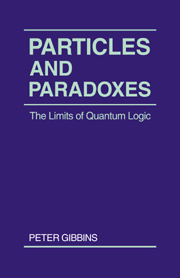6 - Quantum mechanics for natural philosophers (II)
Published online by Cambridge University Press: 15 December 2009
Summary
Quantum mechanics comes in a variety of different forms and formalisms. There is wave mechanics, matrix mechanics, Dirac's version of quantum mechanics, von Neumann's version of quantum mechanics. The philosopher of physics has to ask not only what quantum mechanics means, but also what it is.
Orthodoxy in the philosophy of physics treats quantum mechanics as the general theory of microphysics which takes Hilbert space as its state space and which associates observables with certain special operators on that space. This amounts to a decision as to what quantum mechanics is. However it is a far from arbitrary decision. For the Hilbert space, or von Neumann, formalism summarizes and captures everything that is in the other versions of quantum mechanics, without any of the dubious mathematics of, for example, Dirac's version.
Contemporary philosophers of physics take a very formal view of what quantum mechanics is, a view which has many advantages and some disadvantages. Whatever the disadvantages of focussing on the formalism of quantum mechanics - and it may lead to losing sight of the ‘physics' and possibly to a bias against Bohrian Copenhagenism - it is certainly true that the literate philosopher of physics must have some acquaintance with Hilbert space.
There are in fact several topics we have to deal with, though we deal with them only very cursorily. (This chapter is no substitute for Jauch's classic text Foundations of Quantum Mechanics.)
- Type
- Chapter
- Information
- Particles and ParadoxesThe Limits of Quantum Logic, pp. 87 - 101Publisher: Cambridge University PressPrint publication year: 1987



